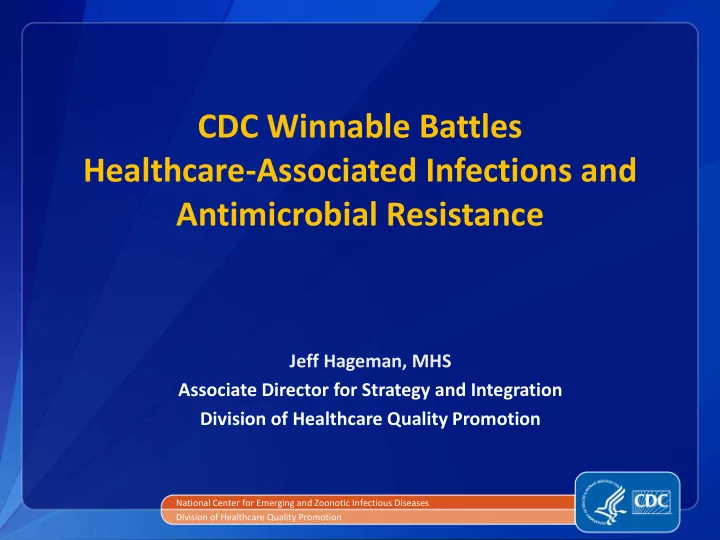

CDC Winnable Battles Healthcare-Associated Infections and Antimicrobial Resistance Jeff Hageman, MHS Associate Director for Strategy and Integration Division of Healthcare Quality Promotion National Center for Emerging and Zoonotic Infectious Diseases Division of Healthcare Quality Promotion
Healthcare-Associated Infections (HAIs) Infections that patients acquire during the course of • receiving treatment for other conditions within a healthcare setting HAIs occur across healthcare settings (e.g., long-term care, • outpatient) Many infections are caused by resistant microorganisms • • Carbapenem-resistant Enterobacteriaceae (CRE) • Methicillin-resistant Staphylococcus aureus (MRSA) State HAI Prevention Programs established in 2009 •
Culture Change “ Many infections are inevitable; some might be preventable “ “ Each infection is potentially preventable, unless proven otherwise ”
States with Public Reporting Policies for Healthcare-Associated Infections (HAIs) 2004 2015 DC* DC* States required to publicly report some healthcare- associated infections
Increasing Transparency: CDC data for State and Federal initiatives
Most Important Information to Consumers Choosing a Hospital How important would that information be to you personally the next time you choose a hospital? Source: Blue Cross Blue Shield of Massachusetts. Looking for Answers: How consumers make health care decisions in Massachusetts, a survey of Massachusetts adults. Presented at the High-Performance Health Care: What It Takes Conference, April 2, 2007. Available at: http://www.bluecrossma.com/common/en_US/pdfs/aboutUs/consumers-make-health-care-decisions-in-ma.pdf.
Healthcare, infections, and antibiotic resistance have moved beyond hospitals Hospitals Outpatient Dialysis facilities Facilities Long-term care http://www.npsf.org/?page=freefromhar 7 m
Outpatient Settings Provide healthcare to patients who do not remain overnight Increasingly complex procedures, vulnerable patients Each year more than one million cancer patients receive outpatient chemotherapy and/or radiation therapy Expansion of services without parallel increases in attention to and oversight of infection control Many outpatient facilities are operated independently and are not accredited, CMS-certified, or state-licensed Lack systematic surveillance to detect infections 5 www.cdc.gov/HAI/settings/outpatient/outpatient-settings.html
• Breaches in cleaning and sterilization of surgical instruments, and other errors related to device reprocessing • Families of 13,700 pediatric surgery patients and 1,600 clinic or urgent care patients were notified 9
Outpatient Settings Policy Options Consider more effective and proactive oversight of outpatient facilities through: (1) Facility licensing/accreditation (2) Provider training, licensing and certification (3) Reporting requirements (4) Investigation authorities http://www.cdc.gov/hai/prevent/policy.html
National Action Plan for Combating Antibiotic-Resistant Bacteria (CARB) National Action Plan for CARB called for a CDC response to: • Detect and respond to resistant pathogens • Prevent spread of resistant infections • Encourage innovation for new strategies Steps needed to meet CARB goals: • Build state capacity • Expand nation-wide lab capacity – Expand efforts to address community AR threats
Modern medicine at risk Loss of effective antibiotic treatment Cancer Treatment could make routine infections deadly • >600,000 patients Pneumonia receive Urinary tract infections chemotherapy 1 Wound infections • ~60,000 cancer Patients who receive specialized care will patients will be be at highest risk hospitalized with Cancer chemotherapy neutropenia and infections 2 Complex surgery Joint replacements • 1 in 14 of these will Organ transplants die from this complication 2 Chronic conditions (e.g., rheumatoid arthritis) 1 Kantar Health, Cancer Impact 2 Caggiano et al, 2005, Cancer Dialysis
Coordinated Approach to Combatting Resistance Won S, Munoz-Price S, Lolans K, Hota B, Weinstein R, Hayden M. for the Centers for Disease Control Prevention Epicenter Program. Rapid and Regional Spread of Klebsiella pneumoniae Carbapenemased CID 2011:53: 532-540
Public Health is in key position to work with healthcare partners and lead coordination 14
HAI/AR Priorities • Combat Antimicrobial Resistance (AR) • Improve antibiotic use • Decrease AR infections ( Clostridium difficile , CRE, MRSA) • Coordinated approach across healthcare • Decrease device- and procedure-related infections (CLABSI, CAUTI, SSI) • Working with states and other partners to prevent HAIs and AR infections
Thank You JHageman@cdc.gov For more information please contact Centers for Disease Control and Prevention 1600 Clifton Road NE, Atlanta, GA 30333 Telephone: 1-800-CDC-INFO (232-4636)/TTY: 1-888-232-6348 Visit: www.cdc.gov | Contact CDC at: 1-800-CDC-INFO or www.cdc.gov/info The findings and conclusions in this report are those of the authors and do not necessarily represent the official position of the Centers for Disease Control and Prevention. National Center for Emerging and Zoonotic Infectious Diseases Division Name in this space
Recommend
More recommend